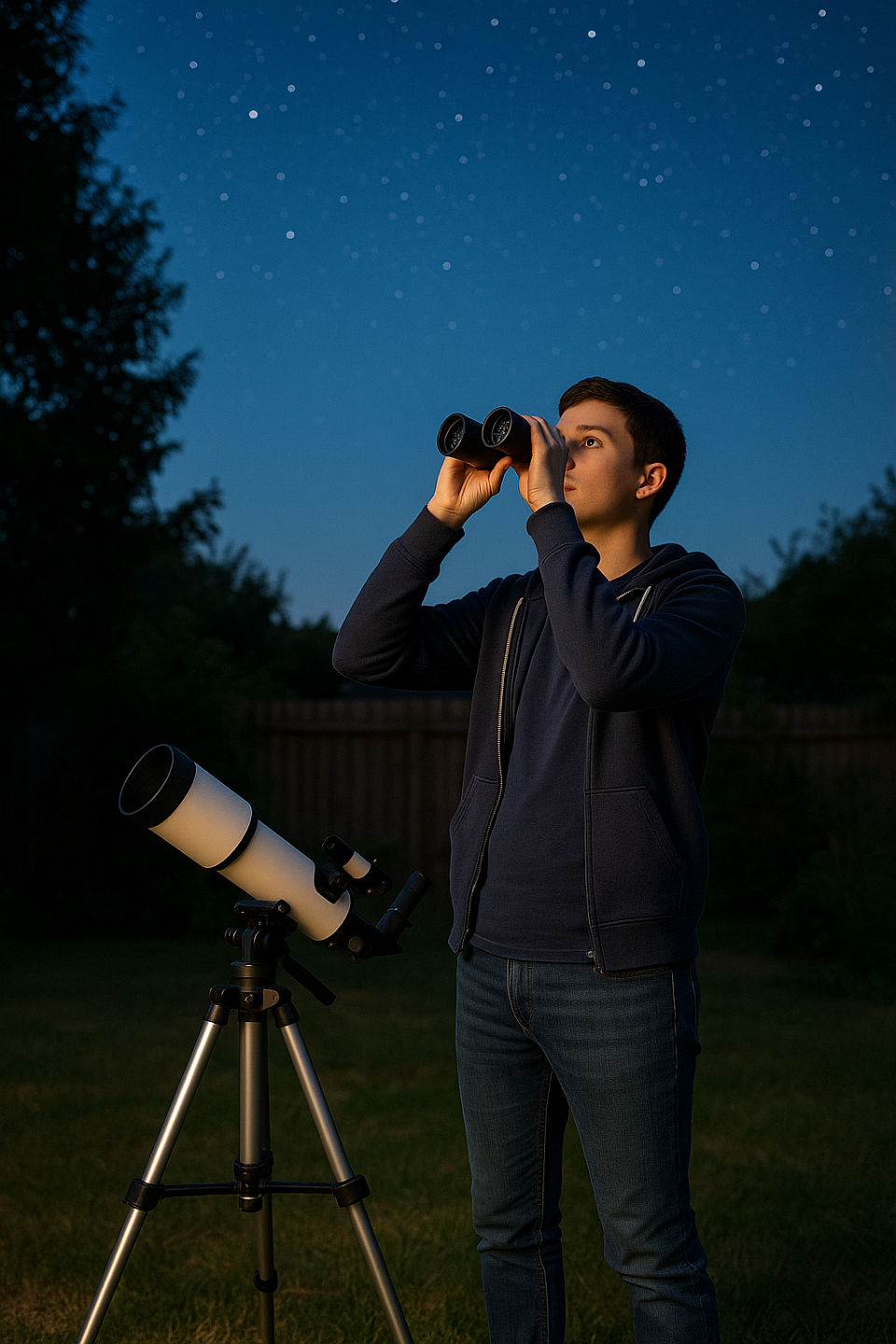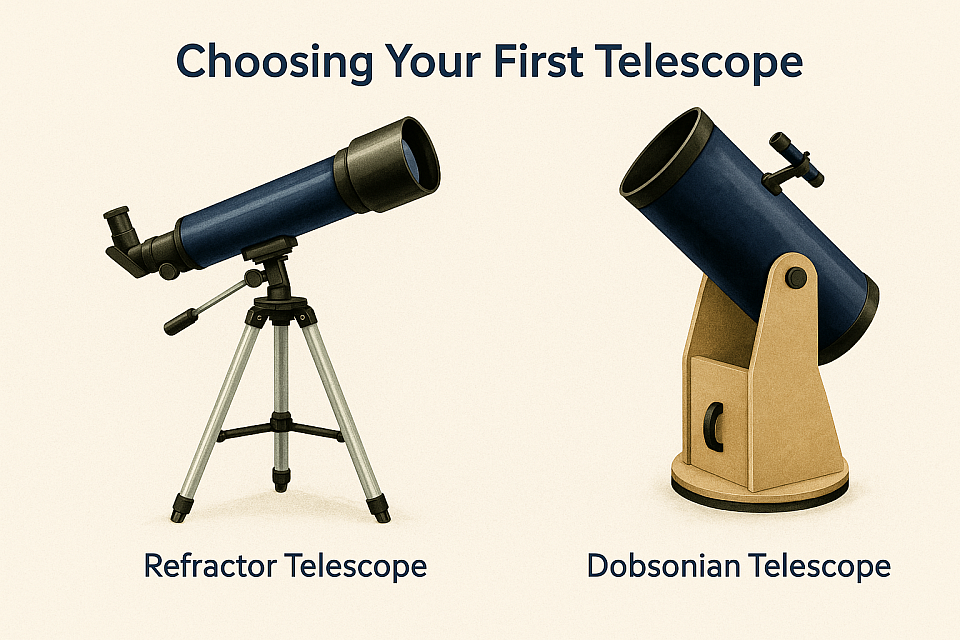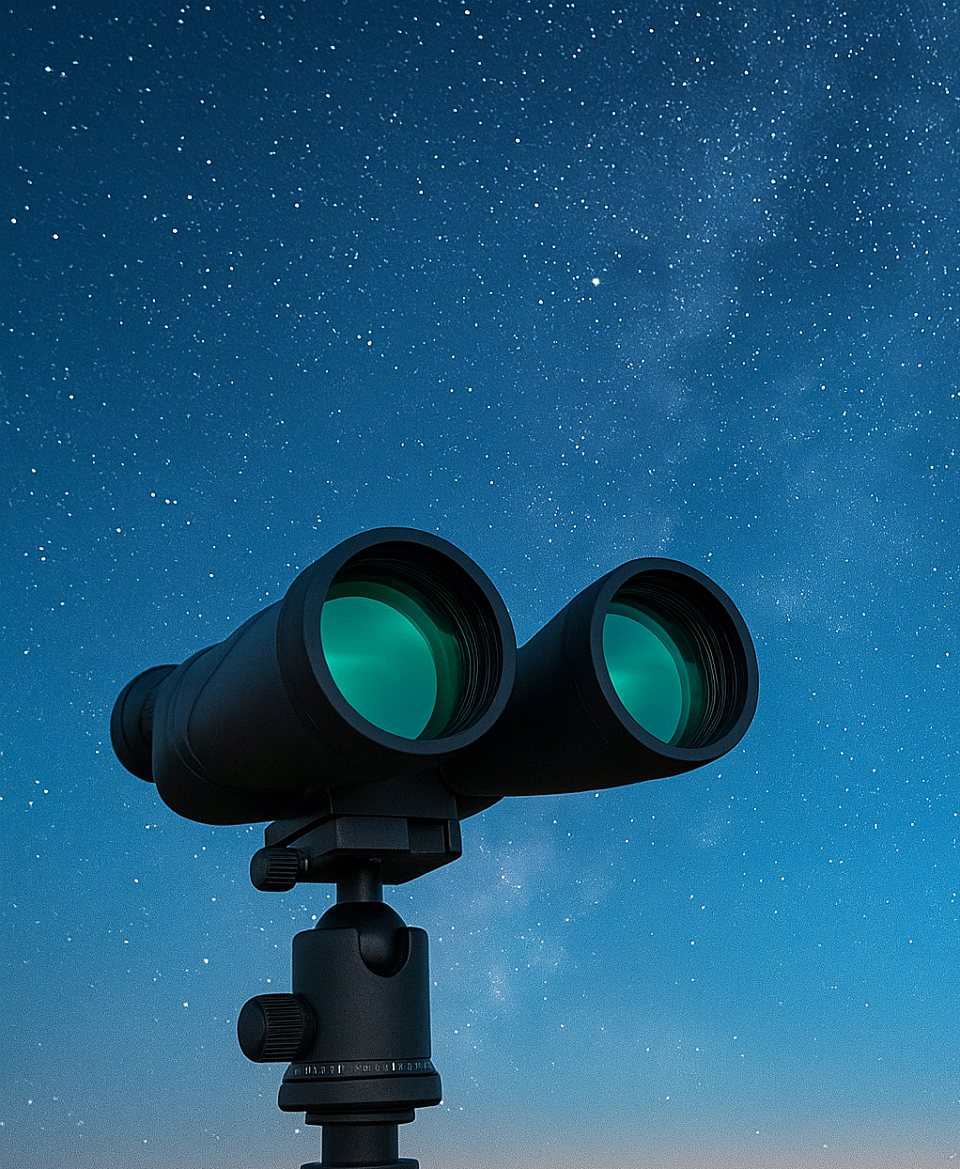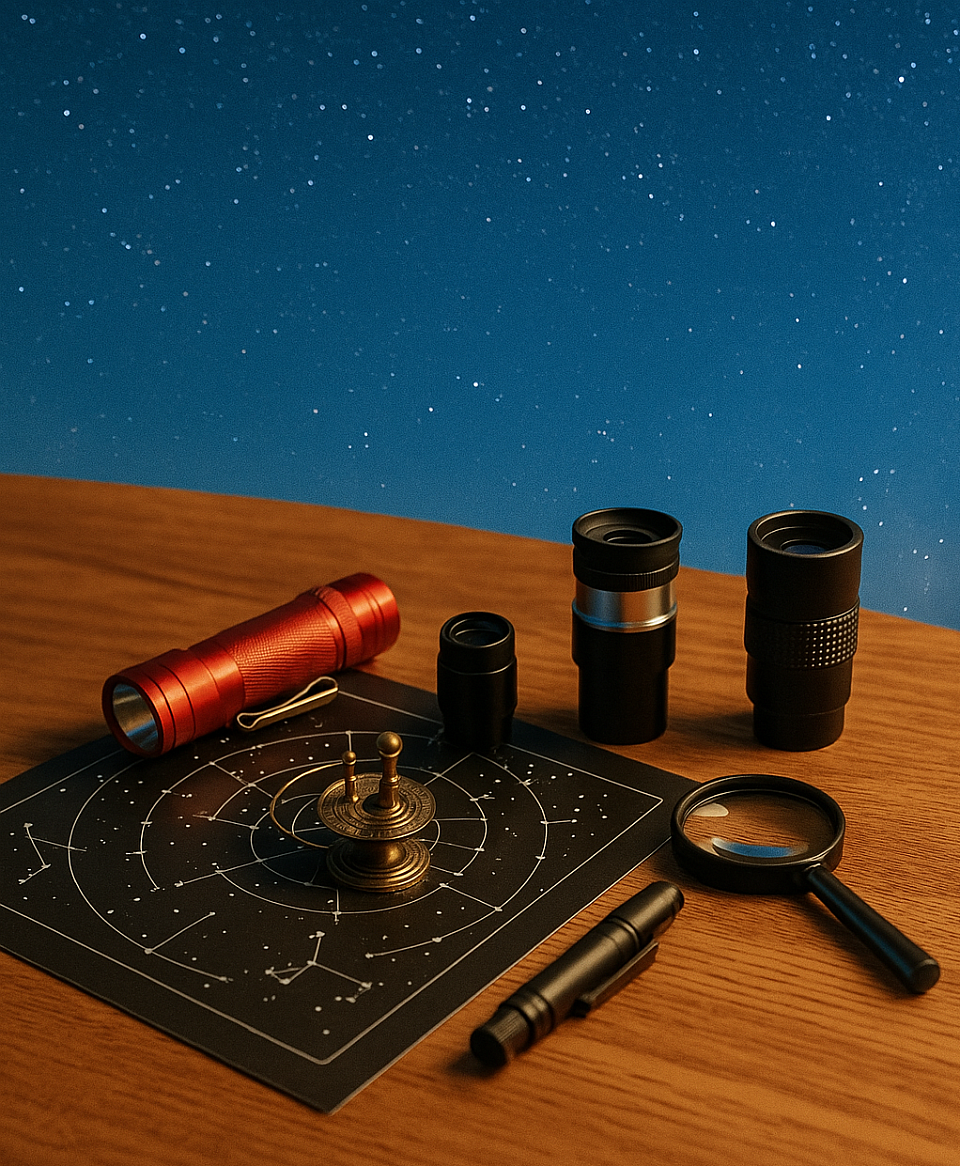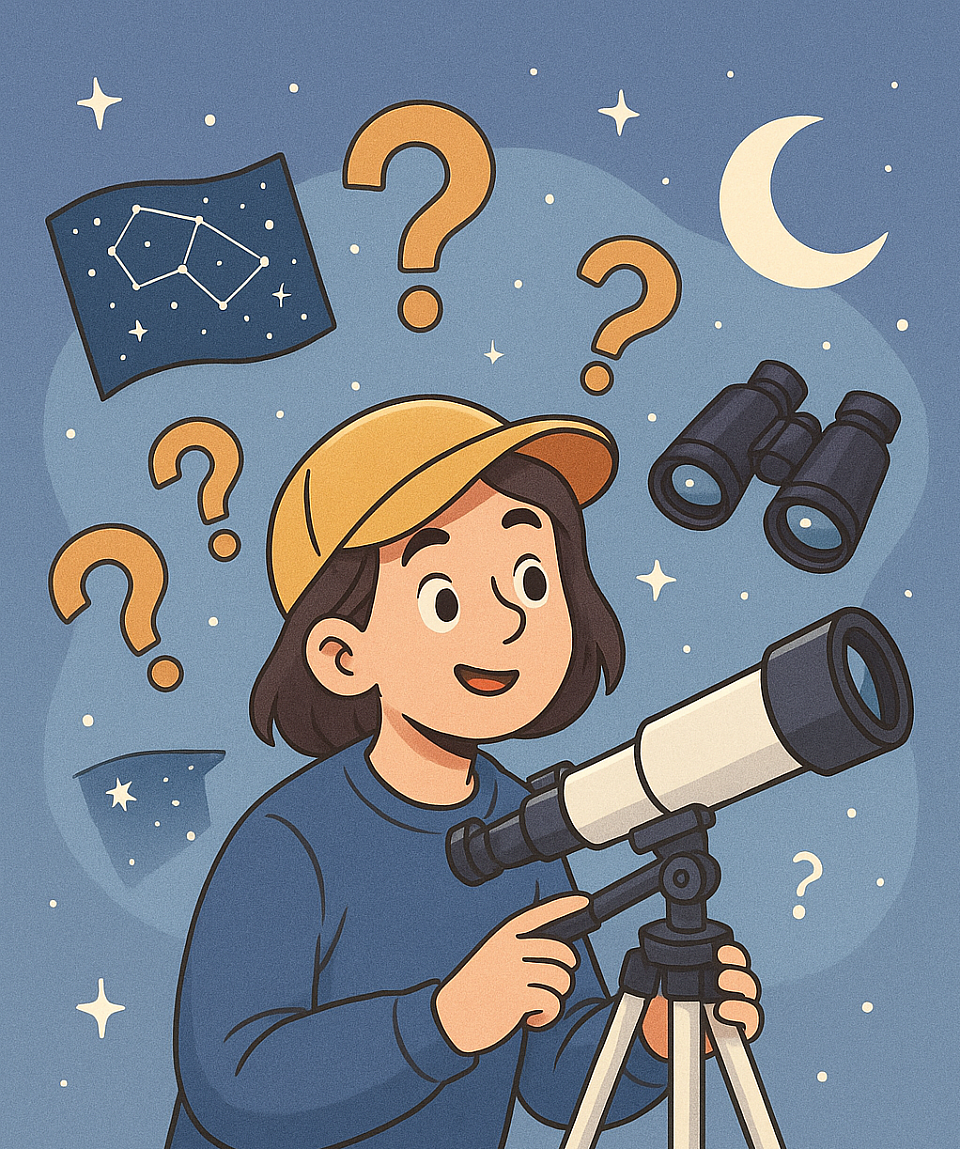Beginner’s Guide to Stargazing Gear: Telescopes, Binoculars & More
Choosing the Right Stargazing Equipment for Beginners: Telescopes, Binoculars & More
New to stargazing gear?
Starting out in astronomy can be exciting—but also overwhelming. With so many telescopes, binoculars, and gadgets to choose from, it’s hard to know where to begin. This beginner’s guide helps you choose the right gear without overspending. Whether you’re stargazing from your backyard or planning your first deep-sky adventure, we’ll help you find the perfect tools to get started.
How to Choose Your First Telescope
Choosing your first telescope can be exciting — but also overwhelming. Here’s a quick guide to help you pick the right one:
🧪 1. Refractor Telescopes
- Use lenses to produce sharp, high-contrast images.
- Ideal for observing the Moon, planets, and bright stars.
-
Low maintenance, great for beginners.
Drawback: Can get expensive at larger sizes.
🔭 2. Reflector Telescopes
- Use mirrors, giving you more power (aperture) for your money.
- Excellent for deep-sky objects like galaxies and nebulae.
- Require occasional alignment (collimation).
🔬 3. Compound Telescopes (Catadioptrics)
Hybrid of lenses and mirrors (e.g., Maksutov or Schmidt-Cassegrain).
Portable, powerful, and versatile — but usually pricier.
Which One’s Best for You?
Budget under £150: Start with quality binoculars or a small refractor.
Budget Telscopes £150–£300: Look at beginner-friendly reflectors or short-tube refractors.
Want to photograph the night sky? Consider an equatorial mount for long-exposure tracking.
Check out my Top recommended Telescopes for beginners and the more advanced Astronomer.
Top-Rated Binoculars for Astronomy Enthusiasts
Binoculars are often the best first step into astronomy. They’re affordable, portable, and easy to use — no setup required!
⭐ Why Binoculars Are Great for Beginners
Wider field of view than telescopes
Perfect for the Moon, star clusters, and even some bright nebulae
Help you learn the night sky naturally
🔍 Recommended Bins for Stargazing
7×50: Great balance of brightness and portability
10×50: Offers more detail but needs steadier hands
12×50 or 12×42: Higher magnification, still lightweight
🔭 Top Beginner-Friendly Models
Hunter 7×50 – Light, sharp optics, excellent value
Kylietech 12×42 – Compact, great for stargazing and travel
Olympus 10×50 DPS – Wide-angle views, rugged build
🛒 Check out our Astronomy Binoculars & Gear Page for current recommendations with reviews and links.
Essential Stargazing Accessories You’ll Need
To get the most out of your telescope or binoculars, a few affordable accessories can make a big difference. These tools help you see more clearly, stay comfortable, and find your way around the sky.
🌌 Must-Have Accessories for Beginners
Star Maps or Astronomy Apps
Learn constellations and plan your viewing with free apps like Stellarium or SkySafari.
Red Light Torch
Preserves your night vision while reading charts or adjusting your gear.
(White light ruins your dark adaptation instantly!)
Phone Adapter for Telescopes
Allows you to take simple photos of the Moon or planets through your telescope’s eyepiece.
Telescope Filters
Moon Filter: Reduces glare for clearer lunar detail Light Pollution Filter: Enhances contrast if you live in a city
Tripod (for Binoculars)
Keeps high-magnification binoculars steady and shake-free.
🛒 We recommend a few accessories on our Astronomy Equipment Shop Page
Frequently Asked Questions (FAQs) for Beginner Stargazers
What’s the best telescope for a beginner?
A refractor or Dobsonian telescope is usually best for beginners. They’re easy to use, low-maintenance, and offer great value for money. See our Top Telescopes Under £300 guide.
Can I use binoculars for astronomy?
Absolutely! A good pair of 7×50 or 10×50 binoculars lets you explore the Moon, star clusters, and even Jupiter’s moons — no setup required.
Do I need a dark sky to see anything?
While dark skies are ideal, you can still enjoy views of the Moon and brighter planets from suburban or even city areas.
How much should I spend on my first telescope?
You don’t need to spend a fortune. Many excellent beginner telescopes are available for under £300.
Can I take pictures through my telescope?
Yes — with a smartphone adapter, you can take simple photos of the Moon or planets. For deep-sky astrophotography, more advanced gear is needed.
Is astronomy difficult to learn?
Not at all! Start with binoculars or a simple telescope, use a sky app, and learn one constellation at a time. It’s a relaxing hobby that grows with you.
Final Stargazing Tips and Recommended Places to Start Your Equipment Shopping
Final Tips for Beginner Stargazers
🔭 Start Simple
Don’t rush into buying expensive gear. Use binoculars or a small telescope and get familiar with the night sky first.
📱 Use a Sky App
Apps like Stellarium, Sky Guide, or Star Walk 2 help you identify constellations and planets in real-time — perfect for beginners.
🗺️ Learn the Sky Gradually
Begin with easy-to-spot objects like the Moon, Orion’s Belt, and the Pleiades star cluster. Build your knowledge slowly.
🔦 Preserve Your Night Vision
Use a red light torch instead of white light — it helps your eyes adjust and spot more stars.
🌍 Join a Local Astronomy Club
They often host stargazing events and offer advice on using gear — a great way to learn and meet others.
Where to Shop for Beginner Astronomy Gear
🛒 Astronomy Emporium Store
Explore our handpicked selection of beginner-friendly telescopes, binoculars, and accessories:
🔗 Top Recommendations
• Top Binoculars for Stargazing

